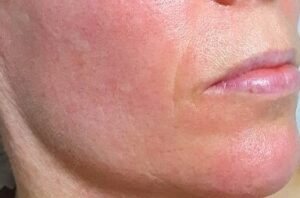
DID YOU KNOW?
Sensitivity can affect all skin types and conditions at any time and is characterized by any combination of discomfort, imbalances and diffused redness. Whilst some cases of sensitivity may be classed as acute and can be the result of incorrect product usage or environmental triggers, many sufferers experience chronic reactivity and find no matter what they do their skin is in a constant state of irritation. One distinctive feature of all forms of sensitivity have in common is the presence of inflammation.
Inflammation is the skin’s natural response to injury or irritating triggers such as stripping products, sun damage or environmental aggressors and is the second most destructive factor (behind UV damage) contributing to premature ageing, pigmentation, scarring and breakdown.
Inflammation (or sensitivity) may be categorized as acute or chronic. Signs of acute inflammation include occasional redness, rashes and itching, whereas chronic sensitivity is defined by persistent pain, heat, redness and swelling.
Acute sensitivity is primarily aggressed by external factors such as UV exposure, dehydration, air-borne allergens, minor burns and irritating skincare ingredients or products. Acute inflammation can often be easily resolved by simply removing the trigger. Chronic inflammation is often fueled by genetic or internal sources resulting in eczema/dermatitis, rosacea, psoriasis and even severe acne. Treatment for these more persistent conditions requires more intensive intervention to manage and reduce symptoms.
SKIN FACT
Over-washing and stripping the skin’s natural barrier function via harsh cleansing or over-exfoliating removes the skin’s protective layer leaving it more susceptible to chronic dehydration, bacterial invasion and persistent reactivity. Humidity, wind and evaporation can also contribute to the loss of skin integrity.
The skin flourishes in a slightly acidic environment. The occasional or continual use of alkaline or very acidic products creates imbalance resulting in redness, itchiness, tightness and burning.
Hormonal changes instigated by stress, puberty and menopause can affect the skin’s biological repair processes. Genetic hormonal imbalances can often contribute to the appearance of diffused redness and dilated capillaries.
Stinging, itching, blotches, tightness and redness are all indicators of skin reaction. The use of any product that creates any of these symptoms should be ceased immediately to prevent further skin damage.
Just because an ingredient or product claims to be ‘natural’, ‘organic’ or hypo-allergenic does not guarantee it will not cause a reaction. All skins are individual and even the toughest of complexions can occasionally react to certain products.
The skin can react to everyday household items such as laundry powder, cleaning products and hand sanitizers. Other common irritants include metals (such as nickel), rubber and even woolen clothing. Inflammation is not just restricted to the face and can appear anywhere on the body.
Foods and food products such as gluten, dairy, MSG, wine and soy can cause skin reactivity for some people. A simple elimination test can confirm any allergies.
CAUSES OF CONDITION
Sensitised and inflamed conditions have four contributing factors that should be taken into account in order to provide effective treatment and management. These include:
- Genetic disorders
- Topical / external irritants
- Allergic reactions
- Food intolerances
Skin disorders including psoriasis, rosacea, ichthyosis, acne and certain forms of eczema are hereditary conditions affecting skin immunity, integrity and health. Whilst sufferers experience various degrees of inflammation and sensitivity, stress and the use of harsh or aggressive skin care products can exacerbate symptoms creating intense dryness, redness, discomfort and heat.
Article courtesy Omniderm 2017
Check our Facials for Sensitive Skin Here: https://dermalessence.com.au/services/signature-facials/
To find out more about your skincare concerns book your appointment at https://dermalessence.com.au/book-your-appointment/
